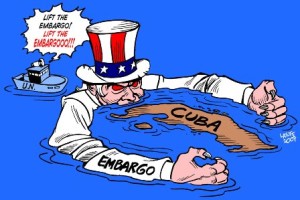By: Novpreet Bajwa
On December 17, 2014, President Obama took a historic step towards the strained relationship between United States and Cuba. He announced that in matters of Cuba, he intends to re-establish diplomatic relations with Cuba and normalize trade relations and travel between the countries. He intends to lift the Cuba Embargo all together starting with the action above mentioned. His first step of this plan eases the travel ban forced on Americans, making it easier for them to travel to Cuba and spend money there. Next is easing the financial restrictions which he plans to implement through Treasury Department by modifying some of the financial restrictions that will allow easier flow of monetary transactions in Cuba. Lastly, Obama intends to establish an American embassy with an ambassador appointed in Havana.
If the embargo is lifted, it will be a historic moment in American history since the embargo had been placed for over 50 years. This action will reverse all the efforts of blocking all trade to Cuba and hindering its economy until the Communist regime is overthrown.
Of course, the lifting of the embargo requires Congressional approval since many sanctions deter United States from establishing any type of relationship with Fidel’s regime and its country. And the fact that Obama boldly announced his intentions with Cuba and started to work with Raul Castro on implementing these changes has not pleased Congress at all, especially Republicans. Many Republicans believe there should not be any ties to Cuba until there is a peaceful transition of government towards democracy. And many will fight the president on his plan since he needs Congress to repeal the many sanctions enacted towards Cuba.
According to Politico, House of Representatives Speaker, John Boehner, also a member of Republican Party, will not support Obama’s plan until Cuba is free from Fidel’s regime. Boehner cites that since the sanctions are enacted he will try to block the effort by not letting the House debate on the issue.
Another supporter of blocking this presidential action is Republican Senator, Marco Rubio, who plans to block any nomination of ambassador of Cuba that the President might make if his plan is approved.
Republicans are not the only ones who oppose this plan. Some Democrats are siding with Republicans on this issue.
Congressmen Robert Menendez and Albio Sires, believe that since human rights are deplorable there, they cannot support Obama’s policy.
With all this tug and pull between the President and Congress, this issue underscores the oldest problem with the government branches—balance of power between them. Obama’s initiation of this policy surely broadens his executive powers with amending United States’ approach on Cuba. The president’s power is to execute the laws legislated by Congress and by trying to change the laws regarding Cuba, Obama reduces some of the limitations forced by Congress on him. Thus, it would be understandable that Congress tries to regain that control granted to it by the Constitution with its power. As a product, Congress tries to check and balance the presidential power.

